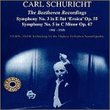| All Artists: Sibelius, Oramo, City of Birmingham Orch Title: Sibelius: Sym No 5 / Karelia Suite Members Wishing: 0 Total Copies: 0 Label: Warner Classics UK Release Date: 9/10/2001 Album Type: Import Genre: Classical Style: Number of Discs: 1 SwapaCD Credits: 1 UPCs: 0685738582228, 685738582228 |
Search - Sibelius, Oramo, City of Birmingham Orch :: Sibelius: Sym No 5 / Karelia Suite
 | Sibelius, Oramo, City of Birmingham Orch Sibelius: Sym No 5 / Karelia Suite Genre: Classical |
Larger Image |
CD DetailsSimilar CDs |
CD ReviewsA gripping Sibelius CD from Birmingham's young successor to Santa Fe Listener | Santa Fe, NM USA | 07/17/2007 (5 out of 5 stars) "After twenty years with the stellar Simon Rattle, his Birmingham orchestra was stuck with finding a successor, so they went in the opposite direction and chose an unknown young Finn, Sakari Oramo. He got off to a shaky start, and I'm not sure the orchestra is going to renew his contract (maybe he's even gone by now). Nonetheless, this is a stunning Sibelius CD from the young maestro. You won't mistake the CBSO for a world-class ensemble, but they are up to Oramo's demands, and what he asks for is incisive, sharp playing with an appealing amount of inner life. Things are further helped along by the vivid, detailed recording with its up-close perspective for added impact.
The First Sym. comes off extremely well, with youthful exuberance in the opening movement and somewhat rough, spontaneous playing that gives this work a sense of freshness. Oramo is a controlled interpreter, like his countryman Esa-Pekka Salonen, but I hear surges of emotion and a willingness to let go of the reins that isn't evident in Salonen. The second movement Andante avoids Tchaikovskian sentimentality, but one isns't prepared for the almost breathless rush of the Scherzo -- it's very exciting, and again the rawness of the playing adds to the effect. The edges are even sharper in the finale, and Oramo keeps the textures lean -- all to the good. You get the feeling here, as elsewhere, that the conductor is genuinely involved and wants us to be, too. The Third Sym. is a tougher nut to crack -- its limited emotional range and classical restraint make it the odd work out among the compossr's symphonies. Fortunately, Oramo acts as if he's never heard this reputation. He keeps the line moving without flagging (the same cannot be said of Colin Davis in his three recordings), even exceeding Bernstein's excellent NY Phil. recording for alert vitality. the second movement, which is rahter dry and repetitive, comes off as a dreamy fantasia unde Oramo. In both symphonies I was very pleased with the conductor's ability to find small changes in tone and phrasing from moment to moment. He decides to slow down more than usual in the second movment of the Third, and I'm a bit confused by the sudden relaxation of rhythm. It's very much in a grazioso style. The finale can seem disjointed, but in Oramo's hands it seems mercurial and vivacious. The program concludes, somewhat unnecessarily with Finlandia. Oramo's reding is as incisive as the rest of the program, and the fine sonics make the growling brass at the beginning really hair-raising. In sum, this was a more exciting outing than I've heard from more famous Sibelians, and Mramo's pesonal touch promises well for the future. Too bad this gripping CD has gone almost unnoticed in the U.S." |




